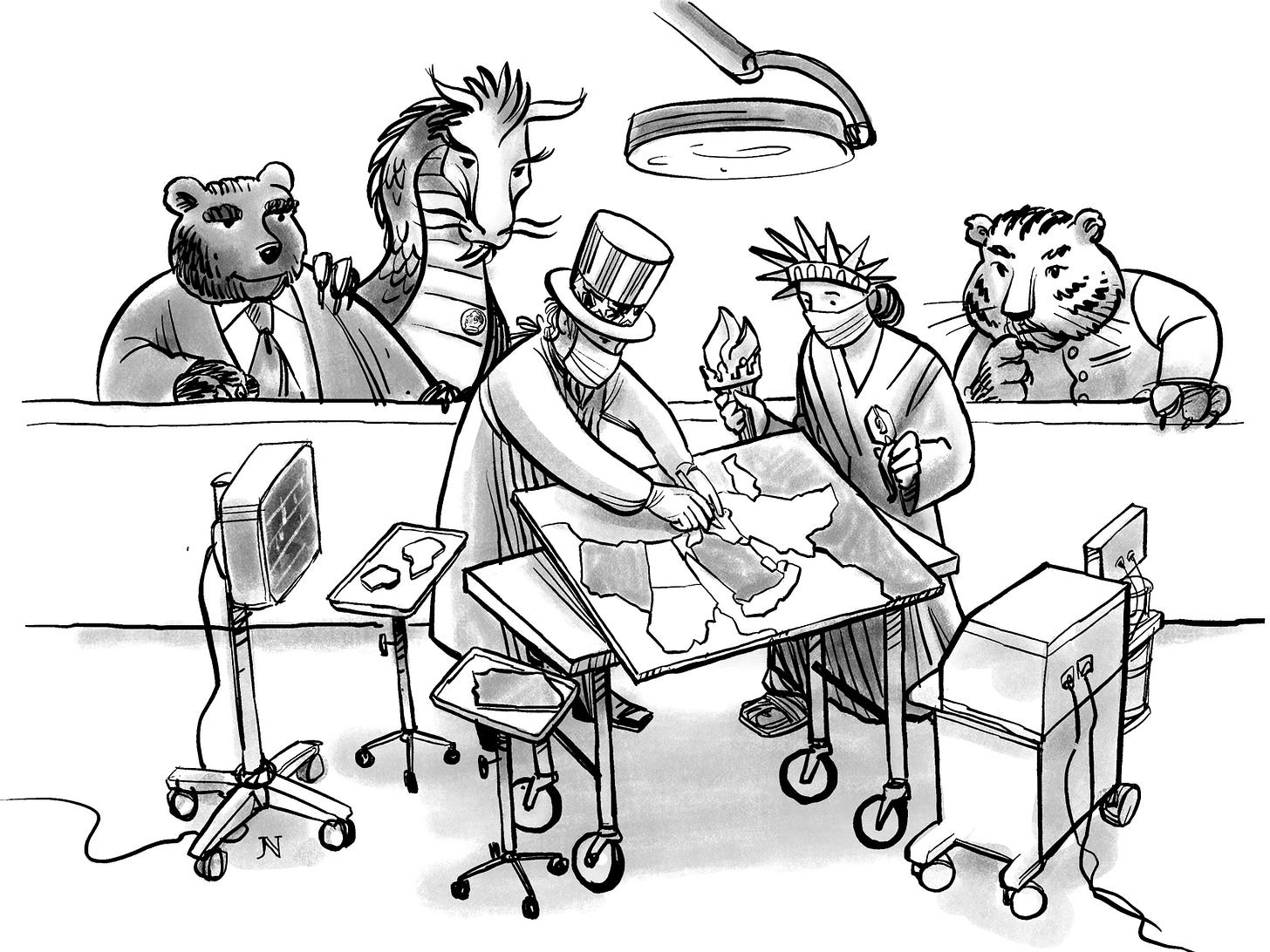Nuclear powers get to war against non-nuclear powers
Because having nukes means no one can threaten you with them
In a multipolar world, which America has sought and enabled for decades now, nuclear power still stand alone, their arsenals empowering them to do as they see fit to smaller, mostly neighboring, non-nuclear powers.
This is the argument I make in America’s New Map:
One seeks membership in the nuclear club to rule out strategic warfare, not trigger it. Nuclear weapons are the ultimate get-out-of-jail card regarding superpower military interventions in smaller states, Russia invading Ukraine being just the latest example.
Nuclear weapons thus establish mutually recognized boundaries for any conflict involving nuclear powers, which is an exceptionally good thing and a key pillar of the US-created international order now defined by globalization.
America has long — and quite frequently — taken advantage of this ruleset. Indeed, it is the enabling pillar of our longtime role (now largely abated) as the world’s policeman. Nobody has used that get-out-of-jail card as frequently as us, and, by doing so, we established quite the precedent for the post-Cold War world.
America’s two decades of post–Cold War policing established the superpower ruleset that says, if you consider Regime X to constitute a profound national security threat to your nation, then you are within your rights to preemptively replace that regime—even to the point of a lengthy military occupation. That was the fundamental ruleset change imposed on the system by the George W. Bush administration through its Global War on Terror (GWOT) and the extended military interventions it undertook in Afghanistan and Iraq.
Make no mistake: Russia and China were paying attention, as were several great powers across the Middle East (consider, for example, the Saudi Arabia-v-Iran proxy war inside Yemen). In effect, Vladimir Putin proved Russia’s freedom to behave similarly vis-à-vis both Georgia (2008) and Ukraine (2014)—two smash-and-land-grabs—prior to his would-be knockout punch of Ukraine in 2022. Everything Putin said and did prior to Russia’s full-scale invasion revealed his belief that he was well within his superpower rights to declare an existential threat that left him “no other choice” but to engage in a “forced measure”—however brutal.
America and the West chose to punish Russia over Ukraine. Good choice.
America and the West stand ready to do the same to China over any Taiwan invasion. Proper stance.
Virtually alone, America is standing by Israel — always to be viewed as a serious nuclear power, which has chosen to respond maximally in a conventional form (non-nuclear) to a terrorist incursion of significant magnitude.
Israel gets to do that as a nuclear power. That’s the ruleset.
America likes to think that ruleset only applies to us, and that we can go anywhere (e.g., across the world) and topple any regime we care to — given the right circumstances.
And, you know what? It truly does apply to us, and we get away with these decisions time and time again.
But now, with no Cold War superpower nuclear hair-trigger standoff and America in strategic retreat across the Obama/Trump/Biden years (not because they alone decided that but because that is what the voters indicated time and again), other nuclear powers are asserting their rights to behave similarly.
Simply put, we modeled the behavior for years while simultaneously encouraging multipolarity and now, this is what we have.
Can we freak out about it and call it “chaos”? Sure, it’s a free country.
But it’s nowhere near chaos. It is a well-established and universally accepted ruleset. Again from my book:
Yes, we still live under the threat of nuclear war, yet that widely accepted scenario has, since those weapons’ invention in 1945, effectively killed direct wars among nuclear powers. As proven yet again in Ukraine, superpowers can wage whatever forms of conventional (i.e., non-nuclear) war they want, while opposing nuclear powers similarly limit their responses to non-strategic means. A bloody fate for Ukraine, but an incredibly positive ruleset for the world.
Same bloody fate for Gaza now. Totally unfair for the average Palestinian, but that was Hamas’s purposeful decision to brutally sacrifice their own.
Israel knows it presently has the writ to do what it thinks it must against both Hamas the threat and Gaza the landscape. Iran will muster all its proxies but will not directly engage Israel because, if it did, it knows full well Israel could most definitely respond in a big-time — even nuclear — manner once it felt the possibility of going down in a loss.
That would be entirely within Israel’s right of self-defense as a nuclear power to do so.
If Israel did that to Iran, there would be no nuclear response from anyone, and Israel would face severe long-term consequences. But it would survive all that, and Iran knows that, understanding that none of the other nuclear powers are going to jump into that fray — once begun. There is simply no reason for them to do so — not at the risk of triggering inbound nuclear strikes. Nobody cares about the Palestinians to the degree of risking nuclear war — except possibly Israel in any do-or-die scenario.
So both nuclear and non-nuclear powers must, to the extent they want to punish Israel now, limit themselves to conventional means — the nuclear ruleset still preserved.
Yes, all sorts of strategists in the West will explore all sorts of concepts for getting around this ruleset, boldly suggesting that nuclear powers will be willing to engage in full-scale conventional warfare with nukes as the ready escalation method — specifically with regard to the Taiwan scenario. But that last part is a lot of brave talk.
If China were to go full-bore on Taiwan, America would not get directly involved in combat with the Chinese — just like we’ll never do the same with Russians over Ukraine. We would back Taiwan to the hilt and we would make China pay too much for any “win.” But there would be no WWIII.
Our generals and admirals can posit this possibility all they want, and there is sound reason behind that threat and those preparations in terms of deterrence, but it ain't happening.
System-level wars are world wars, superpower wars, and nuclear or strategic wars. The world has suffered none of these since the invention of nuclear weapons. These terrifying devices provide us a genuine crystal ball when it comes to strategic warfare, forcing us to recognize its logical endpoint—if we are not careful. There are distinct rules to this existential game, which is why Russia’s invasion of Ukraine in 2022 does not trigger global nuclear war—even if Moscow were to use a tactical nuclear weapon. In that sense, the world is governed by a true global hegemon in the form of Mutually Assured Destruction (MAD)—the foreknowledge that direct war between nuclear powers would ultimately turn cataclysmic.
MAD survives and nothing has changed that reality.
What has changed is our awareness that our modeled behavior since the Cold War has opened the door for other nuclear powers to do what they feel they must to protect themselves and/or prevent key defections (Ukraine, Taiwan) to opposing forces they view as existential threats.
Again, our experts can debate this all they want. It changes nothing.
The US backs Israel right now because Israel is a longtime ally that suffered a horrendous, unspeakable attack. We will attempt to temper Israel’s response but our leverage here is more minimal than we imagine. Israel, as a nuclear power, knows what its “rights” are right now and is motivated to pursue them to the fullest degree allowed.
The world will live with this response because America is backing Israel. We remain the preferred offshore balancer for all manner of great powers around the world.
We can argue domestically about that choice but it is a good one. Alliance has to mean something and we can never equate Israel’s functioning democracy to that sea of authoritarianism that is the Arab Middle East. That difference counts too.
In the end, when all is settled over Gaza, the Saudis and other Gulf monarchies will still fear Iran more than anyone else, and our efforts to codify that anti-Iran alliance will resume.
So, understand, we have crossed no Rubicon here — nor has Israel. Under our larger nuclear umbrella, Israel is pressing its rights as a nuclear power that suffered a grievous attack.
Israel’s actions are neither “chaos” nor unjustified. This is a nuclear/great power ruleset being reaffirmed yet again.
We have entered no new world era nor any new world order.
Simply put, don’t believe the hype.





